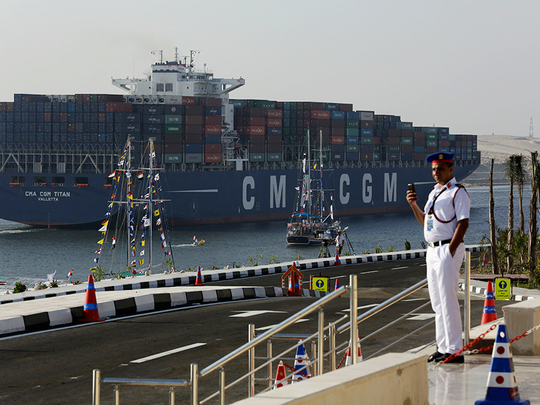
Cairo: Toll revenues for Egypt’s Suez Canal have fallen in September, dampening hopes that a new parallel waterway — which authorities claim will more than double canal income in the next seven years — will boost the economy in the immediate future.
While the canal’s much-hyped extension was one of the mega-projects President Abdel-Fattah el-Sissi said will help spur an economic turnaround, the two months since its Aug. 6 opening have brought in weaker revenues than the same months last year.
Data released on Monday by canal authorities shows that monthly revenue was $448.8 million in September, down some $13 million from the previous month. The year-to-date toll income was $3.9 billion. That compares to $469.8 million in September of last year, when year-to-date toll income stood at $4.1 billion. August 2015 revenues stood at $462.1 million, compared to $510 million in August 2014.
The government says the $8.5 billion project, funded entirely by Egyptians, will boost the canal’s currency in an economy that has been making a gradual recovery from the 2011 uprising that toppled longtime autocrat Hosni Mubarak.
Economists and shippers, however, have questioned its value, saying the increased traffic and revenues the government is hoping for would require a major acceleration in global trade that seems unlikely.
At the canal’s opening, el-Sissi appeared to acknowledge that the project would not yield an immediate windfall, saying it was also meant to reassure his countrymen and the world that Egyptians “are still capable” of great accomplishments.
The man-made waterway linking the Red Sea to the Mediterranean, which was inaugurated in 1869, has long been a symbol of Egyptian national pride, and both state and private media have used it to boost the prestige of el-Sissi, who has staked his legitimacy on stabilising the country and reviving the economy.
The canal revenues have become all the more important in recent months because they are a main source of foreign currency. Egypt’s foreign currency reserves are steadily dropping and in September fell 9.7 per cent to $16.3 billion, at a time when billions of dollars in aid and loans from Gulf Arab nations have started to dry up. Authorities recently devalued the currency twice.
While Egypt’s government is trying to send the message that the country is open for business, authorities admit foreign direct investment is not growing as fast as hoped and investors still complain of bureaucratic hurdles, opaque institutions and red tape.












